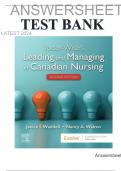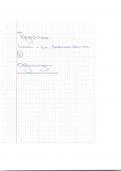-
1. Exam (elaborations) - Test bank for potter and perry's canadian fundamentals of nursing, 7th edition by ast...
-
2. Exam (elaborations) - Test bank for advanced financial accounting 13th edition by theodore ||latest 2024
-
3. Exam (elaborations) - Test bank for potter and perry's canadian fundamentals of nursing, 7th edition by ast...
-
4. Exam (elaborations) - Test bank for canadian fundamentals of nursing 6th edition by potter all chapters 1-4...
-
5. Exam (elaborations) - Test bank for canadian fundamentals of nursing 6th edition 6th edition potter, perry...
-
6. Exam (elaborations) - Test bank for financial accounting tools for business decision making 10th edition pa...
-
7. Exam (elaborations) - Test bank for professional nursing concepts competencies for quality leadership 5th e...
-
8. Exam (elaborations) - Test bank for professional nursing concepts competencies
-
9. Exam (elaborations) - test bank for financial accounting tools for business decision making 10th edition p...
-
10. Exam (elaborations) - Test bank for development through the lifespan 7th edition by laura berk isbn 978-013...
-
11. Exam (elaborations) - test bank for development through the lifespan 4th edition by laura berk isbn 978-01...
-
12. Exam (elaborations) - Test bank for adult health nursing 5th edition by barbara christensen, elaine kockrow...
-
13. Exam (elaborations) - Mc 2024test bank||latest 2024
-
14. Exam (elaborations) - Fundamentals of nursing by craven test bank||latest 2024||answersheet|verified by exp...
-
15. Exam (elaborations) - Fundamentals of nursing thinking doing and caring 4th edition volume 2 wilkinson trea...
-
16. Exam (elaborations) - Fundamentals of nursing thinking doing and caring 4th edition volume 2 wilkinson trea...
-
17. Exam (elaborations) - Test bank for earth science 14th edition by tarbuck
-
18. Exam (elaborations) - Test bank for maternity and women s health care 13th edition||latest 2024 ||verified ...
-
19. Exam (elaborations) - Test bank pharmacology 2024||latest 2024||verified by expert ||answersheet
-
20. Exam (elaborations) - Test bank for maternal child nursing care 7th edition by shannon e. perry, marilyn j....
-
21. Exam (elaborations) - Foundations of maternal newborn and women s health nursing 8th edition murray test ba...
-
22. Exam (elaborations) - Contemporary nursing 8th edition cherry test bank ||latest 2024||answersheet||verifie...
-
23. Exam (elaborations) - Psychiatric nursing 8th edition keltner test bank||latest 2024||verified by expert||a...
-
24. Exam (elaborations) - Test bank for rubin s pathology clinicopathologic foundations of medicine 7th edition...
-
25. Exam (elaborations) - Test bank for communication in nursing 10th edition by julia balzer riley 97803238714...
-
26. Exam (elaborations) - Test bank clinical nursing skills and techniques 9e perry potter and ostendorf 2024 ...
-
27. Exam (elaborations) - Maternity_women s health care 12th edition lowdermilk test bank chapter 1 to 36 well ...
-
28. Exam (elaborations) - Ascp test bank 2024 latest 2024 verifie by experts ||answershet ||verified by expert ...
-
29. Exam (elaborations) - Test bank pharmacology ||latest 2024 ||verified by expert ||answersheet
-
30. Exam (elaborations) - Test bank for yoder-wise’s leading and managing in canadian nursing, 2nd edition, p...
-
31. Exam (elaborations) - Test bank for yoder-wise’s leading and managing in canadian nursing, 2nd edition, p...
-
32. Exam (elaborations) - Fundamentals of nursing 11th edition potter perry test bank||latest 2024 ||answershee...
-
33. Exam (elaborations) - Test bank for pharmacology connections to nursing practice, 5th-6th edition by michae...
-
34. Exam (elaborations) - Foundations of maternal newborn and women s health nursing 8th edition murray test ba...
-
35. Exam (elaborations) - Test bank for pharmacology connections to nursing practice, 4th edition by michael...
-
36. Exam (elaborations) - Test bank for pharmacology connections to nursing practice, 5th edition || verified b...
-
37. Exam (elaborations) - Test bank for communication in nursing 10th edition by julia balzer riley 97803238714...
-
38. Exam (elaborations) - Test bank for business mathematics in canada 10th canadian edition jerome full chapte...
-
39. Exam (elaborations) - Test bank for maternal child nursing care 7th edition by shannon e. perry, marilyn j....
-
40. Exam (elaborations) - Test bank for canadian fundamentals of nursing 7th edition by potter and perry's ver...
-
41. Exam (elaborations) - Test bank for biological psychology 14th edition james w kalat.||latest2024||verified...
-
42. Exam (elaborations) - Test bank for campbell biology 12th edition lisa a.stamped |||latest 2024 ||answershe...
-
43. Exam (elaborations) - Test bank for sensation and perception 9th edition e.bruce goldstein isbn 10113395849...
-
44. Exam (elaborations) - Test bank for womens health a primary care clinical guide 5th edition youngkin schade...
-
45. Exam (elaborations) - Physical examination and health assessment 9th edition by carolyn jarvis ann eckhardt...
-
46. Exam (elaborations) - Test bank maternity & women’s health care 12th edition lowdermilk test bank questio...
-
47. Exam (elaborations) - Test bank for community and public health nursing 10th edition rector (newest update ...
-
48. Exam (elaborations) - Test bank for applied pathophysiology for the advanced practice nurse, 1st edition up...
-
49. Exam (elaborations) - Test bank for community and public health nursing 10th edition by cherie rector, mary...
-
50. Exam (elaborations) - Test bank for comprehensive radiographic pathology 7th edition by eisenberg||latest 2...
-
51. Exam (elaborations) - Test bank for nursing for wellness in older adults by miller 9th edition latest updat...
-
Show more





